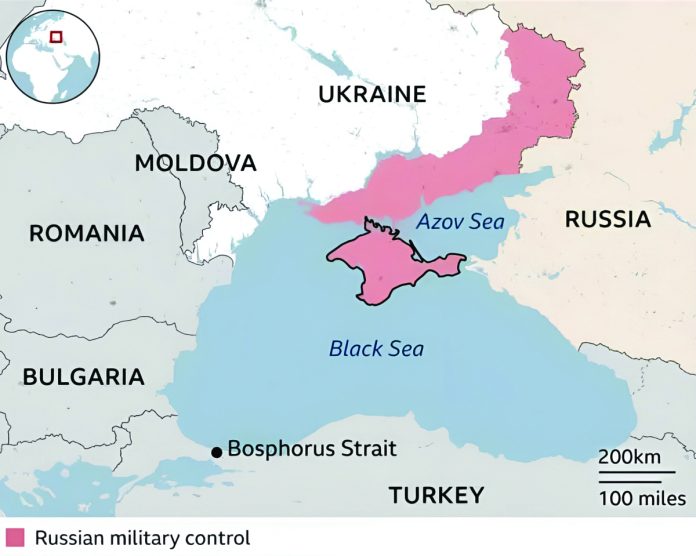Dr. S. Bushra Batool
In a significant development amid on-going conflict, Russia and Ukraine have separately agreed to a naval ceasefire in the Black Sea following three days of peace negotiations held in Saudi Arabia. The breakthrough, brokered by the United States, marks a potential step toward easing tensions in one of the world’s most strategically and economically vital maritime corridors. According to statements from Washington, both countries have committed to halting military activity in the Black Sea and pledged to implement measures that enforce a previously agreed ban on attacks against each other’s energy infrastructure. This agreement is seen as a revival of earlier attempts to secure the region for international trade, especially for agricultural exports.
The ceasefire is expected to reopen crucial trade routes and help stabilize global food prices, which have surged since the original grain deal between Russia and Ukraine collapsed in July 2023. That deal, established in 2022, had allowed commercial vessels safe passage through the Black Sea during wartime conditions. However, Russia withdrew from the arrangement, accusing the West of failing to meet obligations related to its agricultural trade. Despite the announcement from Washington, Moscow stated that the ceasefire would only come into effect if specific sanctions targeting its food and fertilizer industries were lifted. Russia is demanding the reconnection of key banks to the Swift payment system, removal of restrictions on Russian-flagged vessels involved in food exports, and resumption of supplies of agricultural equipment.
Ukrainian officials have expressed cautious optimism. President Volodymyr Zelensky called the agreement a positive development but stopped short of celebrating it as a breakthrough. “It is too early to say that it will work, but these were the right meetings, the right decisions, the right steps,” Zelensky said at a press conference in Kyiv. He emphasized that Ukraine could not be blamed for failing to pursue peace, indirectly responding to former US President Donald Trump’s earlier accusation that Kyiv was hindering peace efforts. Ukraine’s Defense Minister, Rustem Umerov, echoed similar sentiments. He noted that third-party nations may play a role in monitoring compliance with the ceasefire terms. However, he issued a stern warning that the movement of Russian warships beyond the eastern part of the Black Sea would be interpreted as a direct violation of the agreement and a threat to Ukraine’s national security. “In this case, Ukraine will have full right to exercise self-defence,” Umerov stated.
The current ceasefire proposal resembles the earlier 2022 grain export deal that allowed the safe transport of essential goods like grain. The end of that agreement in 2023 had a direct impact on global food prices, as both Russia and Ukraine are major players in the international grain market. The recent talks in Riyadh were facilitated by US diplomats meeting separately with Russian and Ukrainian delegates, as the two nations have yet to engage in direct negotiations. The White House confirmed that it would work toward restoring Russia’s access to global markets for agricultural and fertilizer exports, a move that appears aimed at addressing some of Moscow’s concerns. However, it remains unclear when the ceasefire will officially come into effect.
Trump, who has taken a keen interest in the peace process, was asked about the possibility of lifting sanctions in response to Russia’s conditions. He replied, “We’re thinking about all of them right now. We’re looking at them,” suggesting that some flexibility may be on the table to sustain the agreement. Zelensky, however, criticized what he described as a potential “weakening of positions,” referring to the US’s willingness to ease sanctions. He reiterated that Ukraine would continue pressing for tougher sanctions on Russia and increase its request for Western military aid if Moscow failed to uphold its end of the deal. In a televised address, Zelensky accused the Kremlin of misrepresenting the agreement, especially the claim that the ceasefire depended solely on the lifting of sanctions. He suggested this was a strategy by Moscow to delay implementation while continuing hostile actions on the ground.
Indeed, despite the diplomatic efforts, hostilities continued this week. Russia accused Ukraine of attacking its civilian energy infrastructure even while negotiations were ongoing. Meanwhile, Ukraine reported overnight drone and missile attacks, including a large-scale assault involving 139 drones and a ballistic missile. Kyiv also claimed an airstrike killed 30 Russian soldiers in the Kursk region. Earlier, Russia had launched a missile barrage on the north-eastern Ukrainian city of Sumy, injuring over 100 people. Ukrainian officials condemned the assault as yet another example of Moscow’s disregard for ceasefire promises.
The ceasefire agreement also includes a renewed commitment to halt strikes on each other’s energy networks, a key issue in the war. Russian attacks on Ukrainian energy infrastructure have led to widespread power outages, leaving millions without energy during freezing winters. The targeting of nuclear facilities has prompted warnings from international bodies, including the UN’s atomic watchdog, calling for restraint on both sides. While the agreements represent progress, the path to a durable peace remains uncertain. Implementation details are still vague, and mutual distrust runs deep. Yet, observers note that even a limited naval ceasefire could serve as a stepping stone toward broader negotiations, provided both sides demonstrate commitment to the terms. For now, the world watches with cautious hope as diplomacy attempts to navigate the turbulent waters of the Black Sea, once again a focal point of conflict, and perhaps, the first glimmer of reconciliation.
The author is a Research Officer at Rabita Forum International (RFI).







